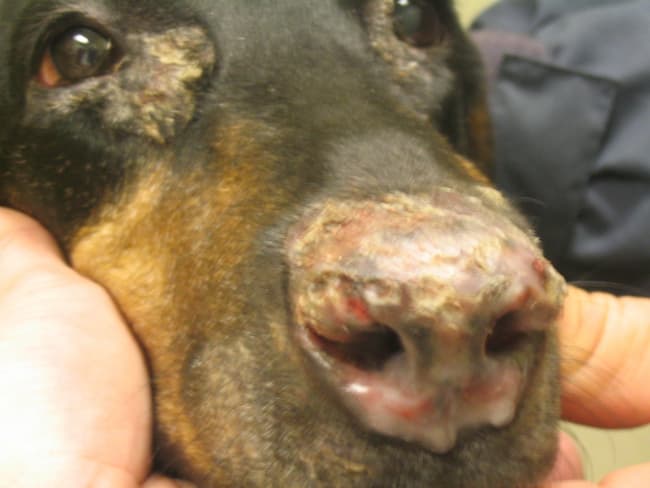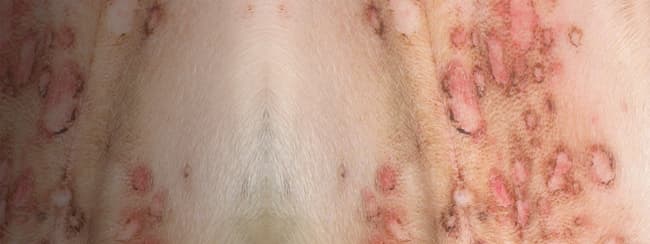When it comes to autoimmune diseases, German Shepherds are one of the breeds that are most commonly affected. There are a variety of German Shepherd autoimmune diseases and because they are such a common breed, it is important for owners to be aware of the signs and symptoms.

There are many different types of German Shepherd autoimmune diseases, and all of them can be quite serious. In this article, we will discuss the most common autoimmune diseases that affect German Shepherds, as well as the symptoms and treatment options.
German Shepherd Autoimmune Disease
First, let’s know what is an autoimmune disease. An autoimmune disease in German Shepherds is a condition in which the body’s immune system mistakenly attacks healthy cells, leading to a variety of symptoms. This kind of disease is found in a variety of dog breeds, but it is particularly common in German Shepherds.
The most common German Shepherd autoimmune skin diseases include the Pemphigus complex, Bullous Pemphigoid, Systemic Lupus Erythematosus, and Discoid Lupus Erythematosus. Let’s know about them in brief:
Pemphigus Complex

This is a group of skin diseases that cause blisters and lesions on the skin. Symptoms include redness, itching, hair loss, and scabs. There are five kinds of pemphigus— Foliaceus, Erythematosus, Glandular, Vulgaris, and Vegetans. This is an autoimmune disease, and it can be managed with steroids and other medications.
Bullous Pemphigoid
This is another skin condition that causes blisters filled with fluid. It typically affects older dogs, and the symptoms include itching, hair loss, redness, and scabs. This disease can be managed with immuno-suppressive drugs and topical medications.
Systemic Lupus Erythematosus
This is an inflammatory autoimmune disease that affects multiple organs, including the skin, joints, lungs, and kidneys. Symptoms of SLE include fever, anemia, joint pain, vomiting, and weight loss. This condition can be managed with anti-inflammatory medications and immunosuppressives.
Discoid Lupus Erythematosus
This is an autoimmune skin disease that causes inflammation and scarring on the face, ears, and scalp. Symptoms include hair loss, redness, itching, and scabs. This condition can be managed with corticosteroids or other medications.
Also, see this guide on Shiba Inu German Shepherd Mix dogs.
Symptoms of Autoimmune Disease in German Shepherds
It is important to recognize the signs and symptoms of autoimmune disease in German Shepherds. Common signs include:
- Hair loss
- Skin lesions or scabs
- Redness or inflammation
- Itching
- Weight loss
Causes of Autoimmune Disease in German Shepherds
The exact cause of autoimmune diseases in German Shepherds is not yet known, but it is believed that genetics and environmental factors may play a role. In some cases, allergies or infections can trigger an autoimmune response. Some of the most common causes of autoimmune diseases in German Shepherds include:
- Genetics
- Environmental factors
- Allergies
- Infections
Treatment for Autoimmune Diseases in German Shepherds
The treatment for autoimmune diseases in German Shepherds will depend on the specific condition. Some treatments may include:

- Steroids or corticosteroids to reduce inflammation
- Immunosuppressive drugs to control the body’s immune response
- Antibiotics or other medications to fight infection
- Diet changes to improve nutrition
- Surgery to remove affected tissue
It is important for owners to be aware of the signs and symptoms of autoimmune diseases in German Shepherds so that they can seek medical attention right away if necessary.
Is German Shepherd Autoimmune Disease Fatal?
Autoimmune diseases in German Shepherds can vary in severity, and some cases may be fatal. It is important to seek veterinary attention as soon as possible if your dog is showing any of the symptoms mentioned above. An early diagnosis and proper treatment plan can help reduce the risk of complications. Additionally, it is important to keep your pet’s environment as clean and stress-free as possible to help prevent the onset of autoimmune diseases.
If your German Shepherd has been diagnosed with an autoimmune disease, it is important to follow your veterinarian’s instructions for treatment and follow-up care. With proper management, your dog can still enjoy a good quality of life.
Conclusion
In conclusion, autoimmune diseases are serious conditions that can affect German Shepherds, and they must be managed carefully to ensure the best outcome. While there is no single cause or cure for these diseases, early diagnosis and proper treatment can help. With proper management, your dog can still enjoy a good quality of life. Read our other articles at German shepherds for more help in pet parenting.
